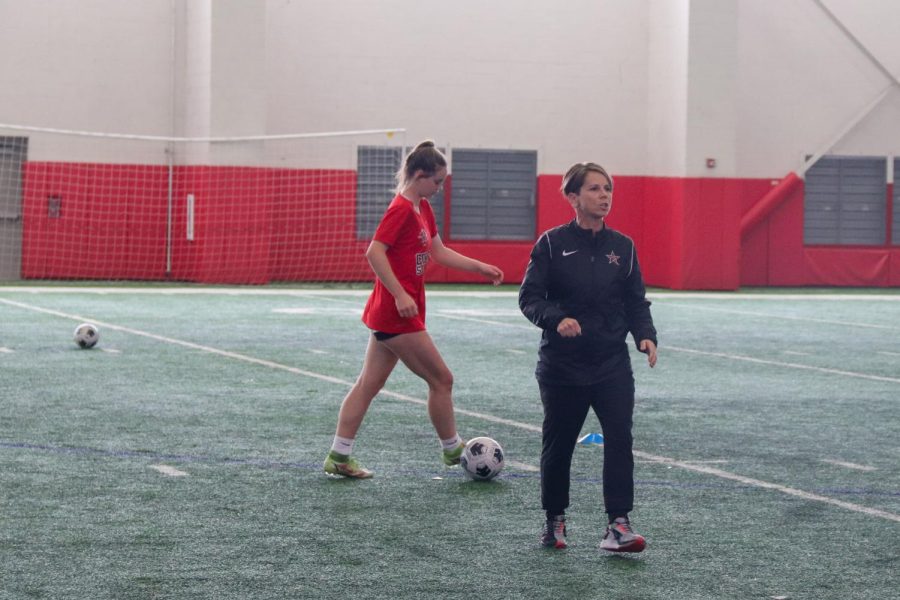Coach’s Box: Benatar-Whitten bringing winning collegiate expertise to field
Coppell girls soccer coach Fleur Benatar leads the team through dribbling drills in CHS Fieldhouse on Jan 27. Benatar is moving to University of Houston to be the women’s soccer assistant after one year at Coppell.
January 30, 2022
From University of North Texas to Hebron High School and finally to Coppell, (having been hired the summer before the 2021-22 school year to coach for the girls soccer team at Coppell High School) Fleur Benatar-Whitten’s coaching experience has led several teams to success.
At only 25, she was Texas Woman’s University’s first head soccer coach. She grew up playing soccer in Richardson, coaches for the Denton Diablos and scouts for national teams.
How have you found coaching in Coppell different from coaching at Hebron, UNT and TWU?
I spent most of my career [coaching for] college, so it’s different when you have three teams as opposed to one team that you handpick. I’ve coached many teams and different levels, but on a daily basis that’s one of the biggest differences you notice: the level of commitment and all the kinds of players. The most I ever had with college was 32 athletes on the roster, and I have 62 kids in the program here. Bouncing around from CHS to CHS9 is just a little bit of logistics, and with the college game, I didn’t have to coach every day. It’s all a juggling act, but the girls are definitely getting better. Every day, I see improvements with many of the athletes, so that’s awesome.
What is your favorite thing about coaching soccer?
I love to see the athletes compete, see them get better and see themselves improve and then enjoy the benefit of being successful. I love soccer, it’s a great game. It’s competitive. It’s fun. They call it “The Beautiful Game,” and I think that’s fitting. It’s pretty nice looking because it’s very skilled and competitive.
How do you conduct a normal practice?
Practices vary depending on what part of the year we’re in. They usually go from simple to complex; the player starts out with a ball each and then transitions to two people with a ball. Lots of touches to get their feet warm and their legs moving. Then we move into group work, where there’s less balls and I’ll make groups depending on what we’re working on. We’ll then move into team concepts. It’s a gradual method of progress from individual to group, and sometimes we start and go through the progressions quickly; sometimes we skip a few and go onto the big team concepts. Now that we’re in district, in season, we don’t spend time doing things that don’t pertain to the impending game.
How do you instill morale in your players?
It starts with the competition and the desire to like the sport. If people don’t want to compete and they aren’t interested in working hard, then it’s a hard place to be in. If you want to compete and you love the game and you’re passionate, then that morale takes care of itself.
What do you wish people knew about being a coach?
It’s not always easy. Some players carry the team more than others. Some people have different roles on the team; everybody has a different role on the team. Once you know your role and you can do it well, it makes it much easier for the coach. So, when people don’t like their role, it gets hard trying to keep the peace and managing the time and talent and abilities. Soccer is a continuous sport: we don’t get timeouts, and it’s a 40 minute half. That’s a long time to continually do something, and working all of the pieces throughout the 80–minute match takes time to understand and go with the flow of the game and the flow of the player. People think it’s an easy job, but once you’re in the shoes it’s completely different.
What do you want your players to take away from the game under your coaching?
I want them to know that they’ve learned something about working at a high level, understanding how to put strategy into play and how grit and competitiveness will pay off in life. No matter where, whether at work or at home, it will pay off having given true grit to the sport. Coaching isn’t easy. Playing isn’t easy. Winning isn’t easy. So if you can endure the hard parts, it will help you later in life.
Follow Saniya Koppikar (@SaniyaKoppikar) and @CHSCampusNews on Twitter.











